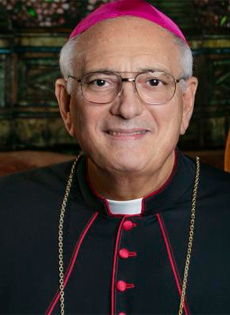
Migrants: To move or not to move, that is the question
Monday, June 26, 2023
*Bishop Nicholas DiMarzio
A statement titled “The right not to have to migrate” was recently issued by the Vatican’s Dicastery for Promoting Integral Human Development. But what does the right not to migrate actually mean?
This basic principle of Catholic social teaching regarding migration sometimes causes confusion because it seems contradictory. Some would say: "Of course you have the right to remain in your home country."
But the decision to leave is not always a free or easy one because circumstances impinge on people's free will. Violence, conflict, endemic poverty and climate change influence people’s decisions to move from their homeland.
Consistent with Catholic teaching, the goal of the Dicastery for Promoting Integral Human Development is to support improving conditions in countries so that its citizens don’t feel like there is a need to leave. This means promoting human rights, liberty, and security in these countries. There is often a conflict involving the right to life, liberty and security versus the right to the freedom of movement.
The Church's social teaching on migration, beginning with “Exsul Familia,” the apostolic constitution on migration by Pope Pius XII, makes it clear that the right to migrate is a basic human right.
This decision was reaffirmed by Pope John XXIII, Vatican II, and more recently by Pope Benedict XVI, who stated: “There is a need to reaffirm the right not to emigrate, that is to remain in one's homeland.”
St. John Paul II said: “It is a basic human right to live in one's own country. However, this right becomes effective only if the factors that urge people to emigrate are constantly kept under control.”
Pope Francis has spoken often about the right people have to raise and support their family in a safe environment, in their home country.
The social teaching of the Church is based on the principle of the dignity of each human person. Each individual has the right to remain in their homeland, but that right is conditioned by the ability to access other basic human rights. If these rights are not available, then the person is free to migrate in search of better living conditions, or more importantly, to escape death.
Once the Church's social teaching is understood, it cannot be claimed that it foments or encourages migration from one country to another. It is always better to improve the living conditions in each country, so that people do not need to migrate.
Migration for humans holds innate challenges, some of which can be very detrimental if they are not controlled in a proper manner. Displacement and separation from one's family, language, and culture always has deleterious effects.
It is the teaching and hope of the Church that people should flourish where they were born. Consequently, the Church’s work is to support acceptable living conditions in all countries, so that people do not have to exercise their right to emigrate.
For this reason, recent criticism of Catholic Charities organizations and other social groups who assist migrants, no matter what their legal status, need to be understood in the light of the constant and wise social teaching of the Church.


Comments from readers